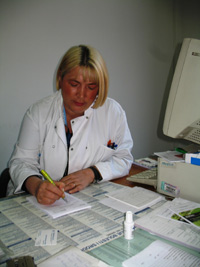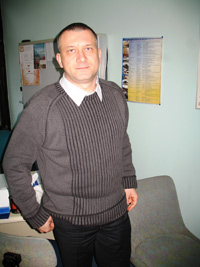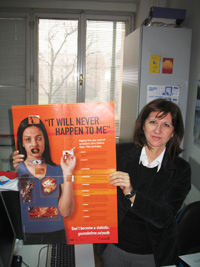They are breaking the law. Smoking is outlawed in all health facilities in Bosnia and Herzegovina (BiH) but hospital administrators allow it because so many doctors and nurses say they need a cigarette every once in a while. Having suffered from a stroke three years ago, Dr. Sanja Mandic-Soldo of The Center for Family Medicine in Sarajevo has cut down from three to one pack of cigarettes a day. Mandic-Soldo said doctors are telling patients not to smoke, but she estimates 60 percent of doctors smoke themselves. (FOTO: CIN)
Having suffered from a stroke three years ago, Dr. Sanja Mandic-Soldo of The Center for Family Medicine in Sarajevo has cut down from three to one pack of cigarettes a day. Mandic-Soldo said doctors are telling patients not to smoke, but she estimates 60 percent of doctors smoke themselves. (FOTO: CIN)
“We are telling our patients to stop smoking because of the health risks,” said Mandic-Soldo. “But I’d guess around 60 percent of doctors in Bosnia are smoking.”
The irony of that is especially strong in her case. Three years ago, at age 42, she suffered a brain stroke that induced double vision. As a result she has cut down from three to one pack a day.
But the fact remains, doctors and nurses in Eastern Europe are among the heaviest smokers anywhere in the world.
Recent BiH estimates suggest that around 50 percent not 60 percent of health care professionals smoke. World Health Organization (WHO) research on European nations, not including BiH, found that Georgia had the highest rate of smokers among health care professionals smoke with 44 percent overall. Alarmingly, two thirds of male medical staff in the former Soviet country smoked. Similarly, more than half the males in the Romanian health service smoked, pushing its average over 40 percent, slightly higher than that of Macedonian medical staff.
Smoking among doctors and nurses in Eastern Europe, typically mirrors the general population where between 35 percent and 50 percent of citizens routinely smoke more than 10 cigarettes a day.
Statistics show that in more developed nations, health professionals have gotten the word about the risks of smoking far more than the general population. Fewer than 7 percent of the health professionals in the United Kingdom smoke, for example, compared to nearly three times as many smokers in the general population. In the United States, a fifth of adults smoke, but only one in 10 doctors.
A high prevalence of health professionals smoking means that the very people expected to lead anti-smoking efforts are unwilling to get involved in tobacco control, according to research carried out by Dr. Haik Nikogosian, a specialist in noncommunicable diseases at WHO.
“It is difficult to convince physicians that smoking is a disease,” said Dr. Zaim Jatić, the Center’s chief doctor and a family medicine professor at the Sarajevo School of Medicine. “It’s difficult to convince half of them that they themselves are sick. Smoking is just not looked at as though it’s something bad.” Dr. Zaim Jatic, head doctor at The Center for Family Medicine in Sarajevo and a professor at the Sarajevo School of Medicine, said it’s difficult to convince physicians that smoking is a disease. (FOTO: CIN)
Dr. Zaim Jatic, head doctor at The Center for Family Medicine in Sarajevo and a professor at the Sarajevo School of Medicine, said it’s difficult to convince physicians that smoking is a disease. (FOTO: CIN)
It’s a similar story around Eastern Europe.
“Doctors who smoke in Romania (around 30-34 percent) probably think just like their patients that smoking won’t harm them,” said Florin Mihaltan, president of The Romanian Society of Pneumology, whose members specialize in dealing with respiratory problems.
A colleague, Dr. Radu Negoescu, head of the Unit of Healthy Lifestyle Promotion at Romania’s Institute of Public Health, added: “In practical terms, efforts to correct the setting are still timid, including the will and striving to correct their own smoking profile.”
One Moldova Hospital has taken a novel approach in an attempt to hasten change.
“We tried to convince the doctors to quit smoking. Last year we organized a contest. The reward was US$100 for doctors who would quit smoking for 6 months” said Mihai Oprea, chief-doctor of the Republic’s narcology hospital responsible for treating addictions. “Ninety percent of the participants quit smoking forever.”
Attitudes among medical practitioners are clearly a factor in why more than a half century after UK researchers first linked smoking with high levels of lung cancer cigarette consumption is more widespread here than almost anywhere else in Europe and more than double that in the U.S. Recent studies show that tobacco is responsible for 42 percent of all deaths in the former Yugoslavia.
Jatić thinks it’s time for more punitive measures to help stop smoking in BiH. He is in favour of local hospital inspectors making an example of doctors like Mandic-Soldo and his own institution, through fines for smoking on the premises.  From 2005 to 2007, Saša Obucina kept his Karuzo restaurant in Sarajevo smoke-free, but he recently lifted the ban. A former smoker, he said he wanted to do something healthy for the town, but that people were not ready. (FOTO: CIN)
From 2005 to 2007, Saša Obucina kept his Karuzo restaurant in Sarajevo smoke-free, but he recently lifted the ban. A former smoker, he said he wanted to do something healthy for the town, but that people were not ready. (FOTO: CIN)
But he has no illusions habits will change anytime soon.
“I don’t believe in significant changes in quick time,” said Jatić. “Small but firm changes are realistic. Every day it gets better. In a couple of decades the situation should be better.”
His view that it may take 20 years for the region to catch up with Western Europe also appears to be reflected in WHO research. Its study found that smoking attitudes of third-year students attending medical, dental, nursing, and pharmacy schools in several countries in southeast Europe are no different from that of current health professionals.
In Albania and Bosnia, four out of 10 third-year nursing students smoke cigarettes, roughly the same as older medical professionals. And fewer than a third of Belgrade medical students surveyed received any training about teaching smokers how to quit. That rate fell to 20 percent of students in Croatia and just one in 10 in Albania.
A PACK A DAY
While substantial work is still required on educating medical students, efforts to help control smoking in other ways are also now under the spotlight.
Regulations banning smoking in public places and restricting advertising are already in place in most European countries, but are poorly enforced in Eastern Europe, say health promotion specialists such as Romania’s Negoescu.
In Albania, tough new laws were introduced in May to prohibit smoking in bars, restaurants, government offices and other public locations. As a result, the American Cancer Society (ACS) sponsored a smoking behavior survey of some 4,000 adults in April and plans to take a closer look at the effectiveness of the new rules later next year. Already, preliminary results show some surprising findings.
“The average smoker is consuming 22 cigarettes per day,” said Hana Ross, strategic director of International Tobacco Surveillance at the ACS. “That is very, very high. In Russia and the Ukraine, which we think of as intense smokers, it is closer to 12 cigarettes per day.”
The study also found that nearly 60 percent of Albanian smokers are men willing to spend heavily to fuel their habit. The average was $436 a year, or the equivalent of two months salary, said Ross.
Still, cigarettes are cheap in Southeast Europe compared to other parts of the continent. A pack of Drina, one of the most widely smoked brands in BiH, costs as little as 1.2KM, or 0.60€ . In Austria, a pack of a popular brand is €2.43.
BUSINESS FIRED UP
Businesses that eschew smoking are emerging, however, even in the smoking-tolerant cultures of the Balkans.
Torte i to in Grbavica, became one of the few cafes around the BiH capital of Sarajevo to offer an entirely smoke-free space when it opened in September. Co-owner Sandra Jelin-Kadric said she wanted a place where children could play and people will relax in a clean environment. So far, the smokers' reactions have been positive.
“In the last year, it became that a lot of people tried to stop smoking,” said Jelin-Kadric. “My husband tried too. When BiH enters the EU, a lot of people will stop smoking. Now they get used to it.”
Restauranteurs with more experience say the change will be hard. From 2005 to 2007 Sasa Obucina kept his Karuzo restaurant in Sarajevo smoke-free but he recently lifted the ban. Over the past two years the restaurant has gradually lost customers. Even internationals, often more attracted to smoke-free dining, began to dwindle. Aida Ramic-Catak, head of health promotion at the Federal Institute of Public Health, wants to collect money from cigarette sales as Serbia does to enforce a comprehensive health promotion strategy. (FOTO: CIN)
Aida Ramic-Catak, head of health promotion at the Federal Institute of Public Health, wants to collect money from cigarette sales as Serbia does to enforce a comprehensive health promotion strategy. (FOTO: CIN)
“I wanted to do something healthy for this town,“ said Obucina, a former smoker. “People aren't ready for such things.”
Laws and other punitive measures that could limit smoking and the costly health problems it causes have lagged because governments often lack cash – and public pressure to act more aggressively. They have until recently been outmatched by local cigarette makers that are growing aggressively and major international tobacco companies that see the region as a highly profitable business area.
Romania has responded by putting a “vice tax” of 30 percent on the sales price of cigarettes, and despite a history of tobacco smuggling and cigarette production, Serbia appears to have at least slowed the spread of smoking with help from a massive nationwide campaign begun in January. It features billboard photos of a suicide bomber. Instead of dynamite, he wears a vest of supersized nicotine sticks.
Cash for the campaign came directly from smokers. Serbia collects 1 dinar from every pack of cigarettes for the Ministry of Health, a third of which goes towards anti-smoking campaigning.
“We are looking to see if we can implement a similar thing here in Bosnia,” said Dr. Aida Ramic-Catak, head of health promotion at the Federal Institute of Public Health. “We are trying to enforce a comprehensive health promotion strategy but we don’t have the money. So we have proposed a similar kind of thing here….. Adding between 0.2 to 0.5 percent to the current tax on cigarettes.”
Though they have not to date, Ramic-Catak hopes that government officials will take action in 2008. In the meantime, Ramic-Catak faces a potentially embarrassing responsibility.
On December 17 she plans to attend the WHO’s 5th meeting of South-Eastern Europe public health specialists in Zagreb, which will debate a major regional public health campaign on the dangers of smoking. She will have to inform her counterparts that BiH does not have the funds to participate.
Smoking Proves Hard Addiction for BiH
Sanja Mandić-Soldo blows out a stream of smoke over the morning coffee she enjoys with five colleagues. The open door to...





